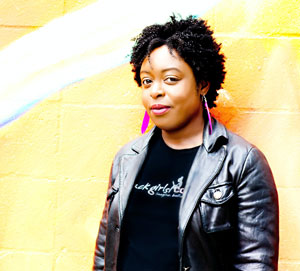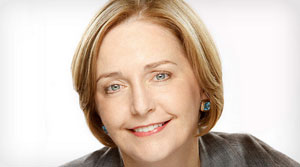5 women busting through the tech industry's glass ceiling
Marissa Mayer and Sheryl Sandberg aren't the only ones leaning in

A free daily email with the biggest news stories of the day – and the best features from TheWeek.com
You are now subscribed
Your newsletter sign-up was successful
Yahoo CEO Marissa Mayer and Facebook Chief Operating Officer Sheryl Sandberg were catapulted into the spotlight when they scored two of the top positions in Silicon Valley — though the tech industry is still largely dominated by men who look like Mark Zuckerberg.
Last year's Fortune 500 list featured just four women CEOs working at tech companies in the top 100, and far fewer women than men are taking on jobs as coders, venture capitalists, and tech entrepreneurs. Experts have pointed to Silicon Valley's "brogrammer" culture and a lack of female role models as contributing to the problem — but women are managing to make huge contributions to the field anyway. A look at five women who are helping pave the way for the next generation of female coders:
1. Jen Myers
The Week
Escape your echo chamber. Get the facts behind the news, plus analysis from multiple perspectives.

Sign up for The Week's Free Newsletters
From our morning news briefing to a weekly Good News Newsletter, get the best of The Week delivered directly to your inbox.
From our morning news briefing to a weekly Good News Newsletter, get the best of The Week delivered directly to your inbox.
Founder, Columbus, Ohio, Chapter of Girls Develop It
Instructor, Dev Bootcamp

When Jen Myers was a high school student in rural Ohio, she didn't have regular access to computer programming classes — or a computer. After turning 20, she decided she wanted to make her own web pages and started teaching herself HTML. She majored in computer science at Mount Union College in Alliance, Ohio — where Myers realized that there was only one other girl majoring in computer science. "I didn't feel pressured to quit, necessarily," Myers says, "but I did feel isolated." Now she's on a mission to make sure girls who want to launch the next Twitter don't feel discouraged. She founded the Columbus, Ohio, chapter of "Girls Develop It," a program that offers low-cost introductory classes on a variety of web development topics. She is also a teacher at Dev Bootcamp, which helps students become web developers in nine weeks. "My favorite response is when a woman is afraid to attend the class beforehand, and is reassured and excited to learn once she [gets] there," says Myers. "We need more people in tech and we need fresh ideas and perspectives to keep moving forward."
2. Tessa Taylor
A free daily email with the biggest news stories of the day – and the best features from TheWeek.com
Founder, Co
Former software engineer at Affinity Labs (acquired by Monster.com)

Tessa Taylor, who is 28 and lives in New York City, had a different educational experience than many other female coders. She attended Smith College, a women's liberal arts college with a small, supportive computer science program. Coming into the tech industry, she found that her gender was "called to my attention on a pretty regular basis." Being a woman programmer (she knows languages like PHP and Node.js) is like "walking into a dog park and having all the dogs sniff you to make sure you fit in." But she says she's had a plenty of great male mentors, and she has no problem being called a brogrammer. "Sure, I'll drink a beer with you," she says.
Still, Taylor says perceptions of women in the tech industry need to catch up to reality: "It happens to me often enough professionally where if I'm in the room with a male colleague, everyone will address the man." She is launching her new company, Co, next month, which helps users sync their Twitter, Facebook, and email accounts and access friends' contact information all in one place. But she chose not to have a co-founder because she was worried that if it was a guy, he would end up getting all of the credit. "It's still frustrating. You want people to address the person answering the question — not the one with penis."
3. Kimberly Bryant
Founder, Black Girls Code

At Vanderbilt's School of Engineering, where Kimberly Bryant learned two coding languages — Pascal and Fortran — she was often the only girl in classes of more than 30 students. None of her engineering professors were women, and none were African American. "It was extremely isolating to enter such an environment right out of high school, and it took me awhile to adjust and to find my rhythm," she says. On-campus organizations like the National Society of Black Engineers were "crucial to my success." So in April 2011, Bryant founded Black Girls Code, because she wanted to create opportunities for girls like her daughter, a middle-school student at the time, to learn programming in an environment that was culturally relevant and not dominated by men.
Today, Black Girls Code operates one-day workshops, summer camps, and 6-week intensive cohorts in a series of after-school sessions on topics such as robotics, game design, and web development. The program is based in San Francisco, and it has multiple volunteer-run chapters around the country (last year, they reached 700 girls in 7 cities in 90 days). "Our goal is to become the Girl Scouts of technology, and we plan to reach over 1 million girls by the year 2020," Bryant says.
4. Mary Louise Krakauer
Executive Vice President of Human Resources, EMC Corporation

Mary Louise Krakauer's mother was a math teacher and her father was a mathematician and physicist, so she was interested in a career in the IT industry from a very young age. She pursued her goals at Princeton University, where she earned a degree in chemical engineering, and later at Harvard Business School, where she got her MBA.
At EMC — a global IT company which has more than 60,000 employees worldwide — Krakauer is actively trying to make the tech industry a better place for women. The company's "Leadership in the FastLane" program is designed to prepare senior women for greater leadership roles: More than 100 women have participated in the program since its launch in 2008. EMC, which offers data storage, information security, analytics, cloud computing and other services, also runs the Field Women's Leadership Forum that provides an outlet for open discussion on how the company can recruit more women and provide them with advancement opportunities.
5. Jennie Lamere
Creator, Twivo

In many ways, Jennie Lamere is a typical 18-year-old: She likes watching shows like Pretty Little Liars, goes hiking with her dad, and is getting ready to go to college in the fall, at Rochester Institute of Technology in New York. She also likes to build robots and enter coding competitions, or "hackathons." In April, Lamere beat out 80 other competitors — all of them male — to win a hackathon event in Boston. Her winning entry was a program called "Twivo," which allows users to stop Twitter from spoiling their favorite TV shows, by blocking mentions of a particular character or show name for a set amount of time. Since Lamere won the event, she has been offered an opportunity to market the app, and has accepted internship offers with Twitter and Crashlytics. Lamere says that after creating Twivo, she took the project back to her computer science class at the Academy of Notre Dame (an all-girls school), and walked her classmates through the code. She told Mother Jones, "Hopefully the other girls will come to the next hackathon!"
Dana Liebelson is a reporter for Mother Jones. A graduate of George Washington University, she has worked for a variety of advocacy organizations in the District, including the Project on Government Oversight, International Center for Journalists, Rethink Media, the Reporters Committee for Freedom of the Press, and Change.org. She speaks Mandarin and German and plays violin in the D.C.-based Indie rock band Bellflur.
-
 Magazine solutions - February 27, 2026
Magazine solutions - February 27, 2026Puzzle and Quizzes Magazine solutions - February 27, 2026
-
 Magazine printables - February 27, 2026
Magazine printables - February 27, 2026Puzzle and Quizzes Magazine printables - February 27, 2026
-
 ‘The forces he united still shape the Democratic Party’
‘The forces he united still shape the Democratic Party’Instant Opinion Opinion, comment and editorials of the day